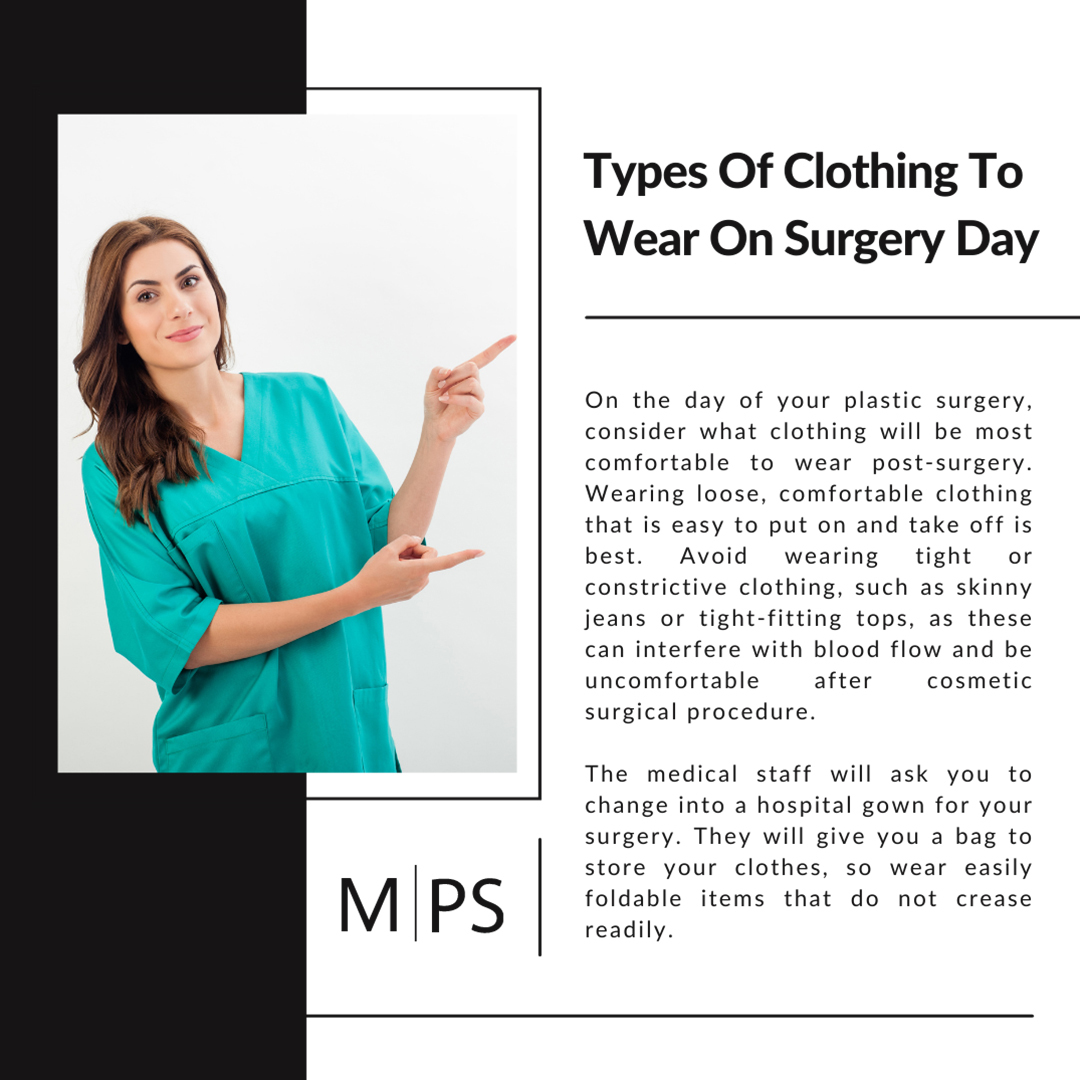Preparing for your surgery can be both thrilling and nerve-wracking. Proper preparation can help alleviate anxiety allowing you to enjoy the excitement of your upcoming procedure. While your surgeon may have answered all your questions about the surgery, they may have yet to cover the surgery day dress code.
Although wearing comfortable clothing on the day of surgery may seem obvious, you should avoid certain items to ensure a smooth procedure. Read on to discover what you can and cannot wear on surgery day.
Types Of Clothing To Wear On Surgery Day
On the day of your plastic surgery, consider what clothing will be most comfortable to wear post-surgery. Wearing loose, comfortable clothing that is easy to put on and take off is best. Avoid wearing tight or constrictive clothing, such as skinny jeans or tight-fitting tops, as these can interfere with blood flow and be uncomfortable after cosmetic surgical procedure.

The medical staff will ask you to change into a hospital gown for your surgery. They will give you a bag to store your clothes, so wear easily foldable items that do not crease readily.
What To Wear Underneath
Your underwear should be loose-fitting, breathable, and made from soft, non-irritating fabric. Additionally, it should be easy to put on and take off, as you may have limited mobility after surgery.
In most cases, hospitals will provide you with disposable underwear to wear during surgery and immediately post-surgical. These are designed to be comfortable, hygienic, and easy to put on and take off.
Accessories To Avoid
- False eyelashes: During surgery, the anesthetist tapes your eyes shut to ensure they do not open and get dry during the procedure. When they remove the tape, the false eyelashes might come off.
- Contact lenses: Wear glasses when possible. If you must wear contact lenses, bring your lens case and solution. You will need to remove them before surgery.
- Hair pieces and wigs: Patients are asked to remove wigs and hairpieces and are given a head cover to wear before surgery.
- Acrylic nails and nail polish: Avoid wearing acrylic nails or nail polish on the day of your surgery. Acrylic nails and nail polish can harbor bacteria, increasing the risk of infection during surgery.
During surgery, your blood oxygen level is monitored with a pulse oximeter, which clips onto your fingertip. Acrylic nails and nail polish can interfere with the accuracy of the reading. Changes in nail bed color can be an essential indicator of your health status during and after surgery. Nail polish can make it difficult to detect these color changes.
Jewelry To Remove Before Surgery
For safety reasons, you must remove all jewelry before surgery. This includes earrings, necklaces, bracelets, watches, and rings. You must also remove piercings such as nose, lip, and belly button piercings and nipple rings.
Jewelry can be a breeding ground for germs that may infect open wounds during surgery. Even if you have cleaned your jewelry before surgery, it’s challenging to eliminate all traces of bacteria or other contaminants.
What Shoes To Wear
You’ll want to choose shoes that are easy to put on and take off, as you may have limited mobility after surgery. Additionally, your shoes should be supportive and provide good traction to help prevent slips and falls.
Avoid shoes with laces or buckles that may be difficult to fasten. Also avoid wearing high-heeled shoes as you may find it challenging to keep your balance.
Read more: Physical Activity And Sex After Plastic Surgery
Hair And Makeup Considerations
Avoid wearing makeup for your surgery. Makeup can contain bacteria or pathogens that increase the risk of post-surgery infection. Plus, your anesthesiologist checks your skin color during your procedure to ensure healthy circulation. Depending on your surgery, the medical staff may ask you to wear a surgical cap or have your hair pulled back and away from your face.
Keeping your hair clean and free from any hair products is a good idea to avoid contamination with open wounds. If you have long hair, you should braid it or tie it back to keep it out of the way during surgery and the immediate post-surgical period.
What To Bring To The Hospital
Your surgical procedure may only take a day, but your doctor or nurse might recommend you stay overnight to recover.
Bring the following items with you for your time at the hospital or outpatient facility:
- Personal Identification.
- Insurance card and any necessary medical paperwork or authorizations.
- Toiletries and personal hygiene items you may need.
- Medications that you currently take.
- A book, music, or other forms of entertainment to keep you occupied during your hospital stay.
Preparing For Surgery
Your healthcare provider will provide specific pre-operative instructions, such as when to stop eating or drinking, what medications to take, and what not to eat or drink. Your doctor may ask you to shower with antibacterial soap the night before and the morning of your surgery. Wash all areas, including your hair.
If you wax or shave, do so several days before surgery. This allows time for small cuts or irritation to heal before the procedure and reduces the risk of infection.
Post-Surgery Clothing
The clothing recommended after surgery depends on the area of the body where the surgery was performed. Loose, comfortable clothing that won’t rub against sensitive areas or incisions is recommended. Loose-fitting pants or skirts with an elastic waistband are best for abdominal surgeries. A loose-fitting shirt that opens in the front is ideal for chest or upper body surgeries. Clothing that is easy to put on and take off is essential.
You may have a limited range of movement post-surgery. Avoid clothing with zippers and buttons that are challenging to open or close. You may also need to wear a fitted garment after surgery and should have something soft and loose-fitting to wear over it.
At Millennial Plastic Surgery, Dr. Shokrian will give personalized guidance for your specific surgery and recovery requirements. This will include suggestions for a compression garment and how long you must wear it after the surgery. If you’re exploring your options for a more contoured and confident you, contact us today to discuss how to get started.

We can’t wait to meet you! We offer comprehensive consultations with Dr. Shokrian, and his team both virtually and in person.
212-421-7123
